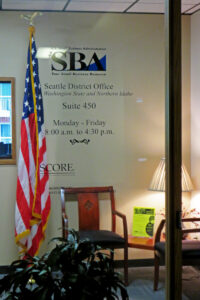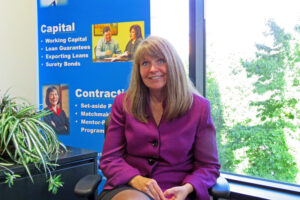by Kirby Lindsay Laney, originally posted 10 October 2017

Only a week remains for business owners to respond to a request from the U.S. Small Business Administration (SBA) for stories about how SBA rules and regulations may have adversely affected local small business development and growth. This survey will finish on October 16th, after which the federal agency will cut the unnecessary rules that stifle business, modernize requirements to better help, and streamline SBA operations, including here at the Seattle District Office.
Our local SBA office has new leadership, as Kerrie Hurd stepped in as District Director last January. Since then, she’s been learning our area, which includes all of Washington State and Northern Idaho. She has also been meeting small businesses owners here, and finding what they need to not only to get started but to grow and thrive.
Hurd comes to Seattle with a business background, having worked as a commercial loan broker. This gives her insight into running a business as well as an intimate familiarity with banking. This all helps with her work at the SBA, which provides loans to small businesses, but also counseling, assistance, and initiatives aimed at supporting the enterprises long proven to be vital to employment and innovation in our overall economy.
‘That Small Business Grow’
“A lot of people think that we are here for the starting business only,” Hurd acknowledged, “We’re also geared to help the small business grow.” She welcomes more business people who might need the SBA due to stalled, or plateaued, growth. “We feel our services are sufficient,” to serve small businesses, she said, “We have enough to meet the demand. We want more demand. We’d like to hear from businesses.”

“Think of us as a giant consulting firm,” Hurd recommended. “We did over 7,000 hours of consulting in 2016,” she observed, “and its free and confidential.” The SBA has educational and assistance programs that run the gamut, and the SBA has partnered with other organizations that provide even more focused help when needed. “We have a lot of creative people and community heroes in our neighborhoods that can help,” she observed, “We’ve built a long list of resources.”
“When I look at the landscape here,” Hurd observed about Seattle, “I see a vibrant community. I’m seeing a lot of truly local businesses.” Yet, she acknowledged that, from the outside, “I don’t know if they are doing well, or struggling.” Until business owners reach out to the SBA, and ask for assistance, there is no way Hurd, or any of her staff, can provide help.
An Invite, And Help Is Available

“We want to be invited out to talk to businesses,” Hurd explained. She referred to Lisa White, the Seattle SBA District Economic Development Specialist, who can help organize a grassroots workshop, tailored and organized for particular audiences with specific interests. These workshops can be led by experts that the SBA has found effective in helping on a breadth of topics. For example:
- Exports: The SBA offers export assistance, helping artisans and other small distributors figure out how to ship and send items to customers safely and legally, and create distribution channels, with loans or insurance plans. “We can help artists and artisans that are interested in learning about the process,” Hurd said, “we can tailor a workshop to a group of interested artists.” As she observed, “about 90% of Washington exporters are small businesses.” The word ‘export’ can sound so grand, she explained, although it can be as small as a craftsperson sending out hair do-hickies, provided they have the proper customs forms and bills of lading.

- Free Workshops: The Seattle SBA website has a full calendar of programs pre-planned and scheduled, and open for registration. One topic request common nowadays is for help navigating social media and the internet world. On October 12th, the SBA has partnered for a Live Webinar on ‘Beyond Google’ and accessing free market research. On October 19th, learn about ‘Your Business On Yelp’ and managing an online reputation. On October 26th, find out about how to nurture a network by ‘Creating Social Media that Sells!”
- More Tech Help: The SBA also has a community partnership with Ignite Washington, an organization that seeks digital equity by providing tools and solutions to small businesses to better access technology. Chaitra Vedullapalli, of Ignite Washington, puts on these digital readiness trainings and Lisa White can help organize these workshops.
- SCORE & Mentoring: The October 19th tech reputation workshop is one of many held in partnership between the SBA and SCORE.org. For over 50 years, trained SCORE volunteers have provided free mentoring to small business owners. Hurd observed that while SCORE volunteers used to be exclusively retired business executives, many SCORE volunteers now still work but give their time, knowledge and expertise from a desire to give back. This national network of volunteers has experience coming from a range of industries, and SCORE volunteers can help with business planning, start-up, management and growth.

- Mini MBA: The SBA Emerging Leaders Program is specifically for owners in business at least three years and with annual revenues between $400,000 and $10 million. This program works like a free ‘mini MBA’, with participants – including minority and women owners – an intensive entrepreneurship program that furthers their education, gives access to expert instruction, all while they work and consult on their own firm.
- Regulatory Hurdles: Navigating regulatory systems often trip up small businesses, especially as so many industries are being transformed rapidly by the advances in modern technology. “We have partners that help with local governance,” Hurd explained, “we also have a strong relationship with the city [of Seattle],” and they can help small business owners find answers – or explanations about how to proceed. “We try to make sure that if a business is having a real problem with a regulation,” Hurd said, “that we can help them navigate.” When small business owners want to raise issues about the government ecosystem, especially issues negatively impacting the small business environment, they can reach out to the Seattle SBA District Regional Advocate Apollo Fuhrman.
- Loans: “The single most demand is for one-on-one help in getting loans,” Hurd explained. The SBA does give loans, and as Hurd observed, “we can be creative on collateral,” where banks can’t be. They offer micro-loans, so businesses limit their risk, and they provide post loan assistance, “to keep the business healthy.” It is true, “we don’t do loans to people that shouldn’t get loans,” Hurd acknowledged. The SBA doesn’t want to be predatory, or to bury a business owner in debt that cannot be repaid. A loan might sound wonderful, and “it might keep the doors open another 6 months,” but if it won’t solve the problem, the SBA can also provide real help that will ultimately create a stronger company.

Streamline to Serve Small Business
Hurd observed, “it is harder to start a new business than retain a business.” This is a primary reason for small business owners to seek assistance before a trouble becomes a problem and a second problem becomes a closing sign. “An already existing business has licenses, a business model, and the owners have already taken some of the risk,” Hurd explained, such as finding a location, doing marketing and training employees. As easy as it may seem to shut the door and start over, rebuilding a reputation, getting new capital, and altogether starting over will be more difficult than reaching out for help.
“We are working to streamline our systems,” Hurd said, about the Reducing Regs survey going on through October 16th. They want to hear from small business owners that have used SBA programs, and loans, about how the experience went, and what can be done to make the SBA better. Right now, new National SBA Administrator, Linda McMahon is traveling the country, to visit 68 different districts (she came to Seattle in July,) to find out how the SBA serves clients and how it can improve.
“We want to understand what the businesses want and need,” Hurd observed. To do that, they need to hear from business owners – or people seeking to become a business owner. Contact the Seattle District SBA at 206-553-7310 or go on-line to www.sba.gov/wa and see the calendar of upcoming workshops and webinars.
Related Articles
- Shopping With The Small Business Administration
- by Kirby Lindsay, November 19, 2014
- Local Effort To Spur Local Shopping
- by Kirby Lindsay, August 10, 2005 in the North Seattle Herald-Outlook
- Shop Small In Fremont
- by Kirby Lindsay, November 23, 2012
©2017 Kirby Laney. This column is protected by intellectual property laws, including U.S. copyright laws. Reproduction, adaptation or distribution without permission is prohibited.

